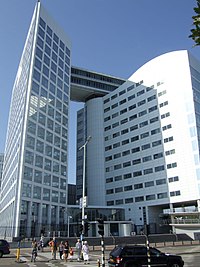International Criminal Court investigation in the Democratic Republic of the Congo
[1] The war started in 1998 and despite a peace agreement between combatants in 2003, conflict continued in the eastern parts of the country for several years.
Katanga was convicted, Chui was acquitted, and the pre-trial chamber declined to confirm the charges against Mbarushimana, currently a fugitive.
Shortly after independence from Belgium, Mobutu Sese Seko seized power in a military coup d'état and installed himself as president.
By 1996, conflict from the Rwandan genocide spilled over into Zaire and Hutu militias, including the Interahamwe, were using refugee camps in the Kivu region to attack Rwanda.
Rwandan and Ugandan armed forces invaded Zaire to fight Hutu militias, and ultimately overthrew Mobutu, in what was to become the First Congo War.
Kabila was assassinated by his bodyguard in 2001 and succeeded as president by his son, Joseph, who eventually negotiated peace talks to end the war.
Although one of the tenets of the peace accords was that rebel forces would join the Congolese army, violence has continued to the present day, especially in the Kivu and Ituri regions.
In July 2003, ICC Prosecutor Luis Moreno Ocampo announced that he had received communications from individuals and non-governmental organisations regarding the situation in the Congo and that his office would closely follow developments there.
The prosecutor charged six people with crimes within the jurisdiction of the Court in the Democratic Republic of the Congo: Thomas Lubanga Dyilo, Germain Katanga and Mathieu Ngudjolo Chui, Bosco Ntaganda, Callixte Mbarushimana, and Sylvestre Mudacumura.
[9] Counts one and two are alleged to have taken place at training camps in Bule, Centrale, Mandro, Rwampara [ceb], Bogoro, Sota, and Irumu [fr].
[9] According to the arrest warrant for Lubanga Dyilo, count three took place during "hostilities in Libi and Mbau in October 2002, in Largu at the beginning of 2003, in Lipri and Bogoro in February and March 2003, in Bunia in May 2003 and in Djugu and Mongbwalu in June 2003.
[10] Germain Katanga, also known simply as "Simba" (the Swahili word for "lion"), was allegedly the commander of the Front for Patriotic Resistance in Ituri (FRPI).
[11][12] Specifically, Katanga and Chui are also accused of launching a coordinated attack against the civilian population of the village of Bogoro on 24 February 2003.
[25] Lubanga Dyilo was already in a Kinshasa prison when the warrant was issued in connection with the killing of nine Bangladeshi peacekeepers from the United Nations Mission in the Democratic Republic of Congo.
[32] Since being indicted, Ntaganda had become a general in the Congolese armed forces and (despite the fact that there was an international warrant for his arrest) still lived openly in the Kivu region of the eastern DRC[33] until he turned himself into the U.S. Embassy in Rwanda on 18 March 2013.
[36] and on 16 December 2011 the judges of Pre-Trial Chamber I by a 2–1 majority declined to confirm the charges and ordered Mbarushimana's release from custody.

